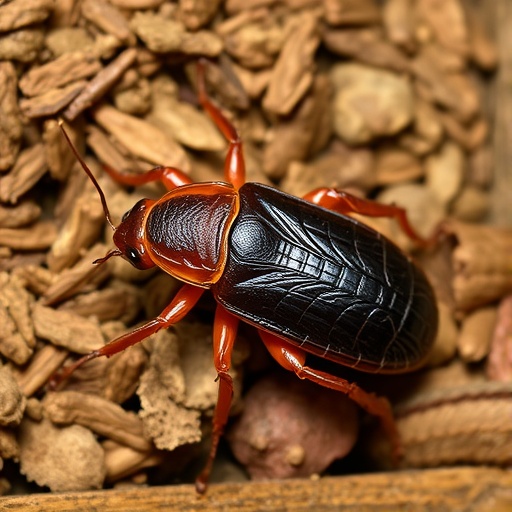In a groundbreaking study that could redefine our understanding of sleep’s biological underpinnings, scientists at the University of Cincinnati have uncovered remarkable parallels between humans and an unlikely subject: the Pacific beetle-mimic cockroach (Diploptera punctata). The research reveals that, much like pregnant women, these cockroaches require increased sleep during gestation, with maternal rest playing a crucial role in the healthy development of their offspring. This discovery bridges the gap between insect and mammalian physiology, hinting at deeply conserved mechanisms governing sleep and reproduction.
The research team, led by Professor Joshua Benoit with significant contributions from postdoctoral researcher Oluwaseun Ajayi and UC graduate Ronja Frigard, explored the sleep patterns of Diploptera punctata, an extraordinary species that exhibits true viviparity. Unlike most insects that lay eggs, this cockroach nurtures its young internally and provides nourishment through milk-like proteins secreted during a lengthy three-month gestation period, a characteristic more akin to mammalian pregnancy than to the typical insect reproductive cycle.
To understand the influence of sleep on reproductive success, the researchers employed an experimental design that involved chronically disturbing the maternal cockroaches’ sleep schedules. They meticulously recorded changes in development duration and monitored transcriptional changes associated with milk protein production. Their results were astonishing: sleep deprivation not only prolonged gestation but also suppressed the expression of vital milk protein genes, directly impairing the nutritional support required for the developing embryos.
These findings have far-reaching implications. Traditionally, the impact of sleep deprivation has been studied primarily in mammals, with a focus on the brain and behavior. However, this study highlights that sleep’s role in reproductive physiology extends far beyond humans and mammals, suggesting that sleep may exert fundamental control over gene regulatory networks critical for offspring viability, even in distantly related species such as insects.
The Pacfic beetle-mimic cockroach serves as a powerful model due to its unique reproductive strategy, sharing important evolutionary features with higher organisms, including internal gestation and live birth nourished by protein secretions. This physiological similarity provides a unique lens through which to examine the interaction between sleep and developmental biology. Moreover, the research highlights the conservation of sleep-related functions across widely divergent taxa, emphasizing the evolutionary depth of sleep’s role in health.
From a molecular perspective, the repression of milk protein transcription under sleep deprivation conditions uncovers a direct mechanistic link between maternal rest and embryonic nourishment. Milk proteins in Diploptera punctata are analogous to mammalian lactation proteins but evolved independently, underscoring a convergent evolutionary strategy. The study’s molecular analyses elucidate how sleep influences gene expression programs critical for sustaining pregnancy, opening new avenues toward understanding sleep-related complications in human obstetrics.
Furthermore, the research contributes to the growing acknowledgment that sleep disturbances during pregnancy can lead to serious developmental consequences. While human studies have documented associations between sleep disorders and adverse pregnancy outcomes, experimental data dissecting these effects have been limited. By establishing a causal relationship through an insect model, this study provides an experimental platform to dissect genetic and physiological pathways linking sleep and pregnancy.
The investigators emphasize that modern society often underestimates the significance of adequate sleep, overlooking its cumulative and sometimes subtle influence on health. Sleep deprivation may not result in immediate consequences but can gradually deteriorate physiological functions, an insight echoed in the impaired reproductive success observed in the studied cockroaches. This adds a compelling evolutionary argument for prioritizing sleep as an integral component of reproductive health maintenance across diverse species.
Beyond its biological insights, the study introduces Diploptera punctata as an invaluable animal model for exploring the intersection of neuroscience, developmental biology, and reproductive physiology. The coupling of behavioral observations with molecular biology techniques in this insect enables controlled investigations into the effects of environmental stressors on reproductive outputs, which could translate to better understanding similar phenomena in humans and other mammals.
One of the most striking aspects of this research is how it challenges entrenched perceptions that insects, with their seemingly simple physiology, operate under entirely different biological rules compared to vertebrates. The evidence that cockroach sleep influences gene expression tied to offspring development underscores the subtle complexity of insect biology and advocates for expanded comparative studies across phyla to uncover universal biological principles.
The implications extend to medical specialties such as obstetrics, where sleep disorders during pregnancy can complicate clinical management. Understanding the molecular cascades influenced by maternal sleep deprivation offers potential targets for intervention or prevention strategies. This insect model can accelerate the discovery of biomarkers or therapeutic approaches by enabling rapid, detailed experimentation not feasible in mammalian systems.
Professor Benoit and his team’s study, published in the Journal of Experimental Biology, exemplifies interdisciplinary research merging entomology, sleep science, genomics, and developmental biology. It showcases the power of animal models in unraveling biological mysteries and highlights the critical importance of sleep not only as a behavioral state but as an essential physiological regulator of reproductive success.
In conclusion, the Pacific beetle-mimic cockroach demonstrates a profound biological truth: sleep is an evolutionary conserved necessity that transcends species boundaries and plays a pivotal role in the delicate balance of pregnancy and early development. As sleep research advances, this study encourages a paradigm shift toward recognizing sleep as a fundamental pillar supporting life from insects to humans.
Subject of Research: Animals
Article Title: Daily activity rhythms, sleep and pregnancy are fundamentally related in the Pacific beetle mimic cockroach, Diploptera punctata
News Publication Date: 4-Aug-2025
Web References:
Journal of Experimental Biology Article
DOI Link
References: University of Cincinnati; Benoit J., Ajayi O., Frigard R., et al., Journal of Experimental Biology, 2025.
Image Credits: Andrew Higley
Keywords: Developmental biology, Sleep, Sleep deprivation, Obstetrics, Pregnancy complications




